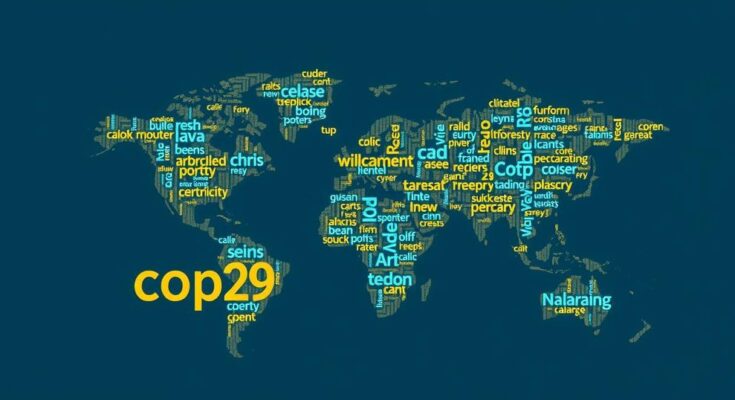G20 leaders in Rio urged a shift from billions to trillions in climate finance, signaling support for stalled UN climate talks in Baku as COP29 concludes. UN officials stress the necessity of reaching agreements on funding and clean energy goals, amidst mixed responses from climate activists on the efficacy of G20 commitments. Sustainable agriculture and water management are highlighted as crucial areas for climate adaptation and mitigation efforts, requiring global cooperation to address urgent challenges.
The G20 meeting in Rio has significantly influenced the stalled UN climate negotiations currently underway in Baku, with leaders emphasizing the urgent need to increase climate finance from billions to trillions. Despite not explicitly endorsing the shift away from fossil fuels, G20 nations recognized the ambitious outcomes from last year’s COP28 talks. As COP29 concludes this week, the urgency of securing new funding for loss and damage, alongside enhanced clean energy initiatives, remains critical, as highlighted by UN climate chief Simon Stiell. He underscored the importance of collective financial reforms to tackle looming climate challenges. UN Secretary-General António Guterres, attending discussions in Rio, reiterated that failure to reach an agreement in Baku would complicate future climate actions, particularly for COP30 set to occur in Brazil. He has urged nations to commit responsibly to achieve substantial results. Meanwhile, reactions from climate activists were mixed, with some expressing optimism and others criticizing the vague language regarding climate financing and fossil fuel transitions. Amid the negotiations, discussions also focused on agriculture, food security, and water management.Harjeet Singh from the Fossil Fuel Non-Proliferation Treaty Initiative criticized developed nations for their lack of commitment to financially support climate justice through grants. As nations prepare their next rounds of climate action plans, the FAO has identified agrifood systems as essential for both adaptation and mitigation of climate impacts. Sustainable agricultural practices can address multiple global challenges, including food insecurity and resource management. The issue of water scarcity and management was similarly underscored during COP29, where experts discussed climate impacts on water resources. With many countries sharing water bodies, the need for international cooperation is paramount to ensure sustainable water management. Experts emphasized that water could act as a tool for conflict resolution rather than instigation, highlighting the necessity for collaborative agreements to manage transboundary water resources effectively.
The backdrop of the article revolves around the global climate negotiations, particularly concentrated on COP29 taking place in Baku, where discussions are centered on enhancing climate finance to address pressing environmental challenges. G20 leaders, meeting in Rio, play a pivotal role in advocating for scalable financial solutions vital for transforming the global response to climate change. The importance of sustainable agricultural practices alongside effective water management represents significant components of the broader climate action strategy. This highlights the interconnectedness of climate change impacts across various sectors, underscoring the need for a comprehensive and cooperative approach to negotiations.
In conclusion, the G20 meeting’s endorsement of scaling climate finance from billions to trillions has provided an essential boost to ongoing negotiations at COP29 in Baku. The acknowledgment of the urgent need for funding and support for clean energy transitions will significantly impact future climate actions and their success. The calls for collaboration, especially concerning agrifood systems and water management, stress the intricacies and interconnectedness of climate issues that require immediate and cohesive global responses. Every nation must share responsibility to ensure that the outcomes of these critical discussions yield productive and equitable climate solutions.
Original Source: www.eurasiareview.com




